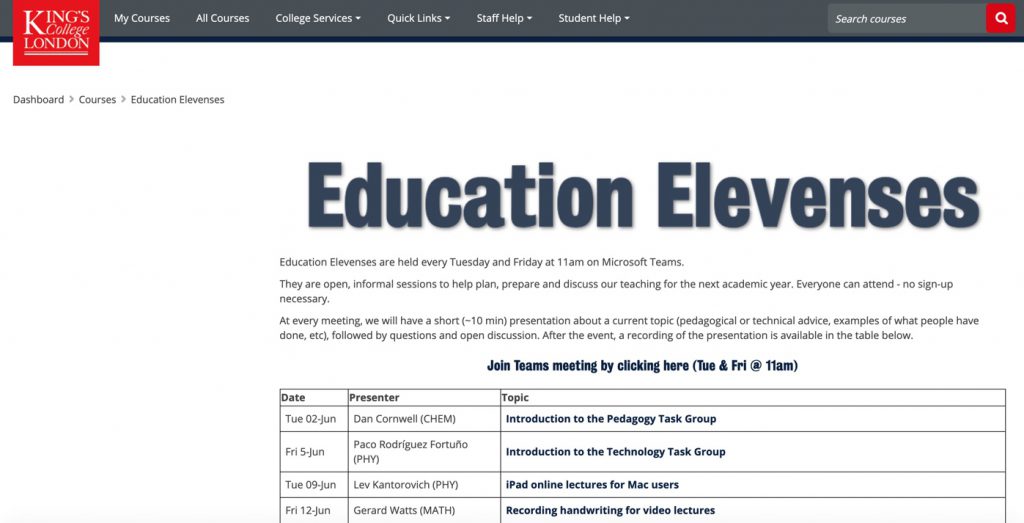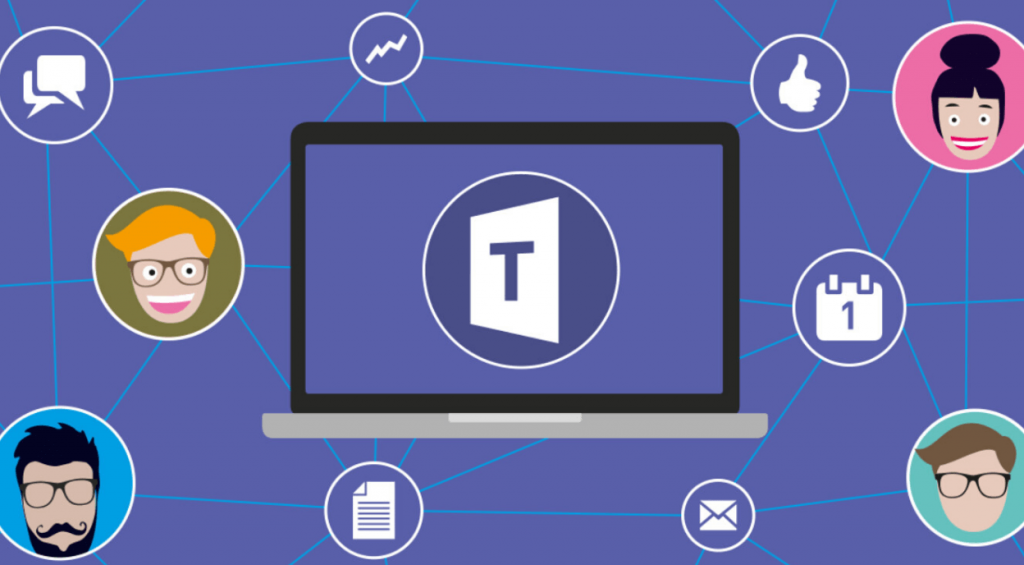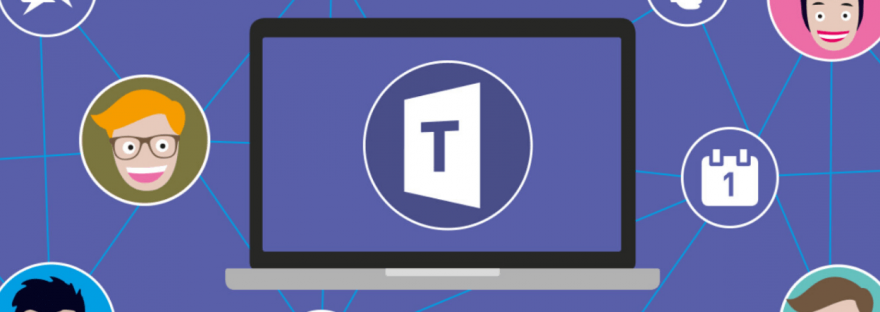Education Elevenses are faculty-wide, peer-led, centrally supported regular meetings in which colleagues share practice and ideas about the pivot to online teaching.
They were first established by Michael Kölling, Vice Dean (Education) in the Faculty of Natural and Mathematical Sciences, with Daniel Cornwell (Lecturer, Chemistry) and Paco Rodriguez Fortuno (Senior Lecturer, Physics) appointed as convenors, supported by Mira Vogel (King’s Academy). After a ten-minute talk on a theme, the remaining time is given over to discussion through which colleagues share knowledge, practice and expand each other’s perspectives. These kinds of informal conversations have never been more important than during a pandemic which has dispersed colleagues into their homes and squeezed out many of the opportunities for free-ranging discussion that existed on campus.
Running twice a week across June and July the Elevenses have consistently attracted between 35 and 50 participants to discuss topics such as ‘Using pre-recorded presentations in synchronous online assessment’, ‘Recording handwriting for video lectures’, ‘Redesigning a module for online teaching’ and ‘Using Workshops in KEATS for peer/self-review/assessment’. Education Elevenses have since been adopted by Arts and Humanities, with some modifications.
Set–up needed to be admin-light. Themes and timeslots were specified in an editable document on SharePoint, and volunteer or invited presenters were encouraged to sign themselves up either by selecting one of the themes or their own topic, and choosing their preferred date. They typed their name in that slot – which meant it was clear to any subsequent presenters which dates and themes were still available – and a convenor would confirm. A dedicated KEATS space (only available to King’s College staff) presented a programme of upcoming events and links to past recordings.

Meanwhile, Microsoft Teams Meetings were set up as a single meeting link copied across all the Outlook Calendar dates, which meant the chat would persist and could be referred back to later.
One important factor in gaining colleagues’ attention and commitment was that all faculty staff received a personal Outlook Calendar invitation sent directly from the Vice Dean Education – somebody known to them, with a key strategic role in their faculty, indicating the value of the Elevenses.
Presenters were briefed to talk for 10 minutes leaving a subsequent 40 minutes for discussion (there was some scope for adapting this format for more interactive talks such as ‘Programme Level Assessment – Why and How?’). They were asked for their consent to record the presentations, but recording was turned off after that so that colleagues could relax and discuss the topic freely and speculatively.
Another important factor is that there are two academic convenors. Together they have an expanded network of potential speakers, sustain each other, make good decisions, and share the responsibilities of chairing and liaising with speakers. This coordination tends to happen in a Microsoft Teams chat rather than email.

Recordings from the Microsoft Teams Meetings are automatically sent to the Microsoft Stream account of whomever activates the recording (so to streamline the process, make this the same person who posts the link to the recording); from there they can be made widely available. After each session a coordinator would paste the recording link into the KEATS space, growing a collection of useful, focused talks from experienced colleagues.
A chair for each meeting is vital. The chair welcomes and introduces the speaker, time-keeps, and encourages and coordinates the ensuing discussion. During the meetings there can be a tendency for the discussion to divert into how to access and operate the technologies. While this knowledge is necessary and the questions understandable, to keep the Education Elevenses discussion educational there needs to be a separate dedicated place where colleagues can post purely technical or operational queries and be confident that those will be promptly answered. The chair can refer colleagues to this dedicated channel for inquiries.
Participants have described their experiences of these meetings.
“Education elevenses fast became my favourite two hours of the week … Whilst at times the prospect of learning so many different ways of approaching the move to online teaching delivery has seemed daunting, my colleagues have risen to the challenge of creating straightforward demonstrations of their approach to remote delivery content.” (Helen Coulshed, Lecturer in Chemical Education)
“The elevenses sessions have been a great forum for me to discover the rich diversity in teaching approaches within NMS. This is for me a very positive experience in knowing that I am not alone both with respect to areas where I feel confident and those that I take as challenges (rooms for improvement). It is reassuring to listen to colleagues and realise that we all are in the same boat with the same destination: promote learning and student experience.” (Ernest Kamavuako, Senior Lecturer in Engineering)
In summary, these events have been occasions for colleagues to be in each other’s company and discuss education, share practice and help with each other’s difficulties and dilemmas. The participation indicates that they have been valued this summer, and they may continue in future.
Written by Mira Vogel (co-authored by Dan Cornwell and Paco Rodríguez Fortuño)
Dr Mira Vogel works as Senior Teaching Fellow at King’s Academy. Dr Daniel Cornwell is a Lecturer in Chemistry Education. Dr Paco Rodríguez Fortuño is a Senior Lecturer in Physics.
